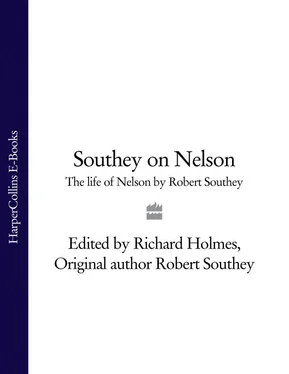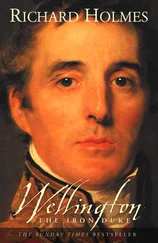If Nelson’s eyes had not been, as it were, spellbound by that unhappy attachment, which had now completely mastered him, he would have seen things as they were; and might perhaps have awakened the Sicilian court to a sense of their interest, if not their duty. The court employed itself in a miserable round of folly and festivity, while the prisons of Naples were filled with groans, and the scaffold streamed with blood.
At such moments it might seem as if Southey was simply casting Emma as Nelson’s sexual nemesis, and the biography has often been interpreted in this way. But Southey is far more subtle than this. He goes on to show how well Emma understood-and matched–Nelson’s own extravagant temperament, how she saved him from recurrent periods of near suicidal depression, and how she genuinely made a new home for him at Merton. While his marriage with Lady Nelson had been childless, the birth of Horatia ‘Thompson’ brought him a wholly new kind of domestic happiness. It also brought him a new sense of a future, and Southey implies that this in turn inspired him to go on to fight Trafalgar. He is brave enough to quote not only Nelson’s last naval signal and diary entry before battle, but also the whole of the open letter ‘bequeathing’ Lady Hamilton to the nation. A bequest which, Southey dryly points out, had not yet been fulfilled by 1813.
Southey was surely right in this complex, nuanced and Romantic reading of their love-affair. Much of its deep and genuine emotion appears in the passionate, unguarded letters that Nelson wrote to Emma in 1802. Although Southey had the materials Emma had supplied to Harrison in 1806 to draw on, he could not have read these particular letters. But they retrospectively confirm much of what he had been able, with some reservations, to suggest of their mutual infatuation.
“You know, my dearest Emma, that there is nothing in this world that I would not do for us to live together and have our little child with us…You, my beloved Emma, and my Country are the two dearest objects of my fond heart…My longing for you, both person and conversation, you may readily imagine. What must be my sensations at the idea of sleeping with you! It sets me on fire, even the thoughts, much more would the reality. I am sure all my love and desires are all to you, and if a woman naked were to come to me, even as I am thinking of you, I hope it might rot off if I would touch her even with my hand.’
Southey accepts Emma’s own authority for one of the most moving passages towards the end of the book. In summer 1805 Nelson is distractedly walking the little lawn in the Merton garden which he called his ‘quarterdeck’. He had not accepted a new command, and claimed to be happy in retirement, surrounded by ‘his family’. Sensing his secret restlessness, Emma ‘knew he was longing to get at the combined fleet’. She destroys her own happiness by encouraging him to ‘do his duty’–to go back and take over the Mediterranean battle station off Toulon. Southey presents this as an act of supreme unselfishness on both their parts, and a final justification of their love. ‘If there were more Emmas, there would be more Nelsons.’
In fact Emma Hamilton comes strangely to dominate the later chapters of the biography, and there is a sense in which Southey had written a great, doomed Romantic love story. Like many biographers, Southey only seems to have become aware of the underlying emotional drive of his own book after it was published. His inhibitions may also have been released by the publication of some of Nelson’s love letters to Emma in 1814, and her own death in the following year. Certainly the main additions he made to the biography, long after in 1827, consisted of expanded passages about Emma and extracts from her own letters to Nelson.
Finally the process of writing lead Southey to revise many of his erstwhile political opinions, and his views of British Government policy in the Mediterranean, particularly where Nelson had been involved in Corsica, Sardinia, and Naples. He also came to reflect on the whole notion of patriotic ‘duty’, which is not merely the subject of Nelson’s famous Trafalgar signal, but is a powerful theme running through the whole biography, affecting not only Nelson’s career but also his love affair.
Here, paradoxically, the poet Southey, driven all his life by his own demons of duty and principle, discovered a profound sympathy for the patriot Nelson and his compulsive loyalties. It also forced the one-time disaffected radical to reconsider the meaning of English patriotism itself. In his final chapters Southey produced some of the finest, and most unexpected passages of Romantic English nationalism ever written. They were perhaps consciously intended to echo and even rival Shakespeare’s Henry V.
The death of Nelson was felt in England as something more than a public calamity; men started at the intelligence, and turned pale, as if they had heard of the loss of a dear friend. An object of our admiration and affection, of our pride and of our hopes, was suddenly taken from us; and it seemed as if we had never until then known how deeply we loved and revered him…He has left us, not indeed his mantle of inspiration, but a name and example which are at this hour inspiring hundreds of the youth of England–a name which is our pride, and an example which will continue to be our shield and our strength.
Shortly before publication in spring 1813, Southey began to feel more confident about the book. In January he wrote to his old friend Walter Scott, a rival poet of verse romances, who was also turning to prose in the shape of historical novels. He described his biography with a touch of pride as ‘a subject not self-chosen, and out of my way, but executed con amore.’
To his uncle and literary patron, Herbert Hill, he wrote in February, repeating the cautionary image of the cat walking among crockery. But now he added: ‘if I have succeeded in making the narrative continuous and clear–the very reverse of what it is in the Lives before me–the materials are, in themselves, so full of character, so picturesque, and so sublime, that it cannot fail of being a good book.’
The reviewers agreed with him. They found the book timely, well-written and surprisingly free from hagiography. They praised the ‘vigorous, plain narrative’ (The British Critic), and the intensely gripping battle scenes, ‘minute in detail, admirable in execution’ (The Eclectic Review). They also approved of the measured handling of Nelson’s character. ‘The author is not so dazzled by the glory of Lord Nelson as to be blind to his defects’, wrote The Critical Review. ‘Mr Southey has an eagle’s–or rather perhaps he would wish us to say–a poet’s eye: and he has ventured to look fully and fixedly upon the sunny radiance of Nelson’s fame, and hath both seen and marked the blots of infirmity, by which it was partially obscured.’ They all agreed that Southey had correctly identified the two great controversies of Nelson’s career–Naples and Lady Hamilton—and had thereby set the pattern for all subsequent biography.
Young Lord Byron, whose taste reflected the sharpest fashion of the day, made a point of reading Nelson as soon as it appeared, and meeting its author on one of his rare visits to London for its publication. Having mocked Southey’s verses, he was surprised by what he found in the flesh. ‘The best-looking bard I have seen for some time. His appearance is Epic; he is the only existing entire Man of Letters…His prose is perfect…His Nelson is beautiful.’
Another potentially hostile critic, William Hazlitt, who detested Southey’s shift in political beliefs, also made an exception for Nelson, and the way it was written. ‘His prose style is plain, clear, pointed, familiar, perfectly modern in texture, but with a grave and sparkling admixture of archaisms in its ornaments and occasional phraseology. He is the best and most natural prose-writer of any poet of the day: we mean that he is far better than Lord Byron, Mr Wordsworth, and Mr Coleridge for instance.’ (The Spirit of the Age)
Читать дальше












